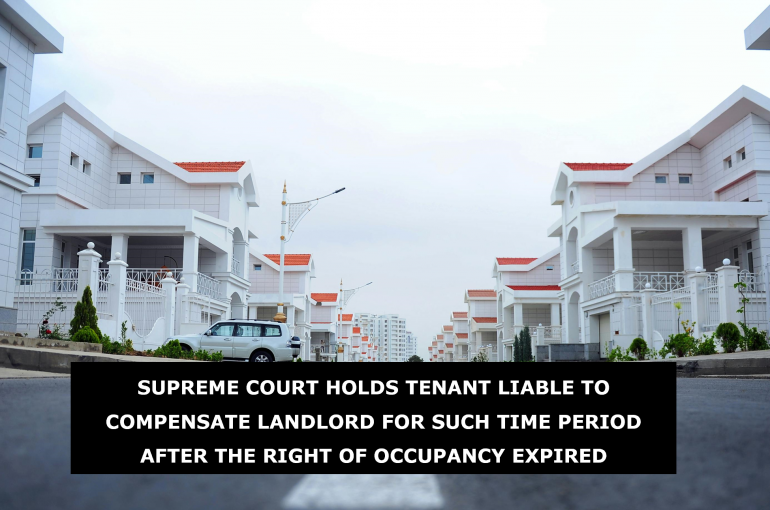SUPREME COURT HOLDS TENANT LIABLE TO COMPENSATE LANDLORD FOR SUCH TIME PERIOD AFTER THE RIGHT OF OCCUPANCY EXPIRED
Recently in a matter of Bijay Kumar Manish Kumar HUF vs Ashwin Bhanulal Desai, I.A. No. 120219 / 2020 in Special Leave Petition (C) No. 4049 of 2020 and other connected petitions, a two Judge Bench of the Hon’ble Supreme Court comprising of Justice J.K. Maheshwari and Justice Sanjay Karol passed a Judgment dated 18-05-2024 and observed that a tenant who entered into lawful possession of a property and continued to be in such possession after his right to do so extinguished, would be liable to compensate the landlord for such time period after the right of occupancy expired.
Facts
1) In the present case, the Petitioner- Landlord, Bijay Kumar Manish Kumar Hindu Undivided Family (HUF) filed four Suits of Eviction, under the Transfer of Property Act 1882 (TP Act) against the Respondent- Tenant, Ashwin Bhanulal Desai before the Civil Court, at Calcutta on the ground of non-payment of rent in respect of all four rented premises.
2) The Respondent-Tenant filed an Application under Order VII Rule 11 of the Code of Civil Procedure 1908 (CPC) (Rejection of plaint) seeking rejection of Plaint citing that false averments were made in the plaint and that the Court lacked jurisdiction under the TP Act, as the dispute ought to be governed by the West Bengal Premises Tenancy Act, 1997 (Tenancy Act)
3) The Respondent’s Application was rejected by the Civil Court on the ground that “Without a full-fledged trial and evidence the court cannot come to conclusion that the averments made in the plaint are false and frivolous or that there is any suppression of material fact.”
4) Aggrieved, the Respondent-Tenant filed an Appeal before the High Court of Calcutta. The High Court upheld the Civil Court’s decision to dismiss the Respondent’s Application, vide Order dated 31-03-2015. The High Court further remanded the matter to the Trial Court for deciding the matter.
5) The Trial Court decreed the Suits in favor of the Plaintiff on the ground that the tenancy, which is the subject matter of the Suit, was created w.e.f. 20-11-1992 and the Tenancy Act came into force w.e.f. 10-07-2001. Thus, the Agreement between the Parties would be governed by TP Act.
6) Aggrieved, the Respondent-Tenant filed Appeals in O. / 1582-85 / 2019 before the High Court, which were allowed, vide Order dated 07-11-2019, on the ground that Tenancy Act would be applicable and hence, the Plaintiff’s Suits were not maintainable.
7) Aggrieved, the Petitioner-Landlord filed Special Leave Petition (C) No. 4049-4052 of 2020 before the Hon’ble Supreme Court. During the course of hearing, the Petitioner-Landlord offered time to the Respondent to vacate the premises and hand over vacant possession to the Petitioner. But thereafter, the Petitioner-Landlord filed (a) I.A. No. 120219 / 2020 in Special Leave Petition (C) No. 4049 of 2020, (b) I.A. No. 120227 / 2020 in SLP(C) No. 4050 / 2020, (c) I.A. No. 120235 / 2020 in SLP(C) No. 4051 / 2020 and (d) I.A. No. 120248 / 2020 in SLP(C) No. 4052 / 2020 and sought for disposal of the Applications asking the Respondent to pay the rent at the market rate.
Supreme Court Observations
The Hon’ble Apex Court, vide Order dated 18-05-2024, made the following observations in the aforementioned Applications:
That in the present case, the Petitioner’s premises were all located in the heart of Kolkata and the Respondent had delayed payment of rent for such prime location premises for a considerable period of time. Hence, by applying the law laid down in earlier judgments, the Bench observed that “a tenant who once entered the property in question lawfully, continues in possession after his right to do so stands extinguished, is liable to compensate the landlord for such time period after the right of occupancy expires.”
Conclusion
Therefore, based on the aforesaid observations, the Bench allowed the IAs filed by the Petitioner-Landlord and held that the Respondent-Tenant is liable to deposit the amount of Rs. 5,15,05,512/- (Rupees Five Crores Fifteen Lakhs Five Thousand Five Hundred and Twelve only) as claimed by the Petitioner, with the Registry of the Apex Court.
However, the Bench noted that the directions made in the IAs were subject to final outcome in the aforementioned SLPs.
Harini Daliparthy
Lead Senior Associate
The Indian Lawyer





































Leave a Reply